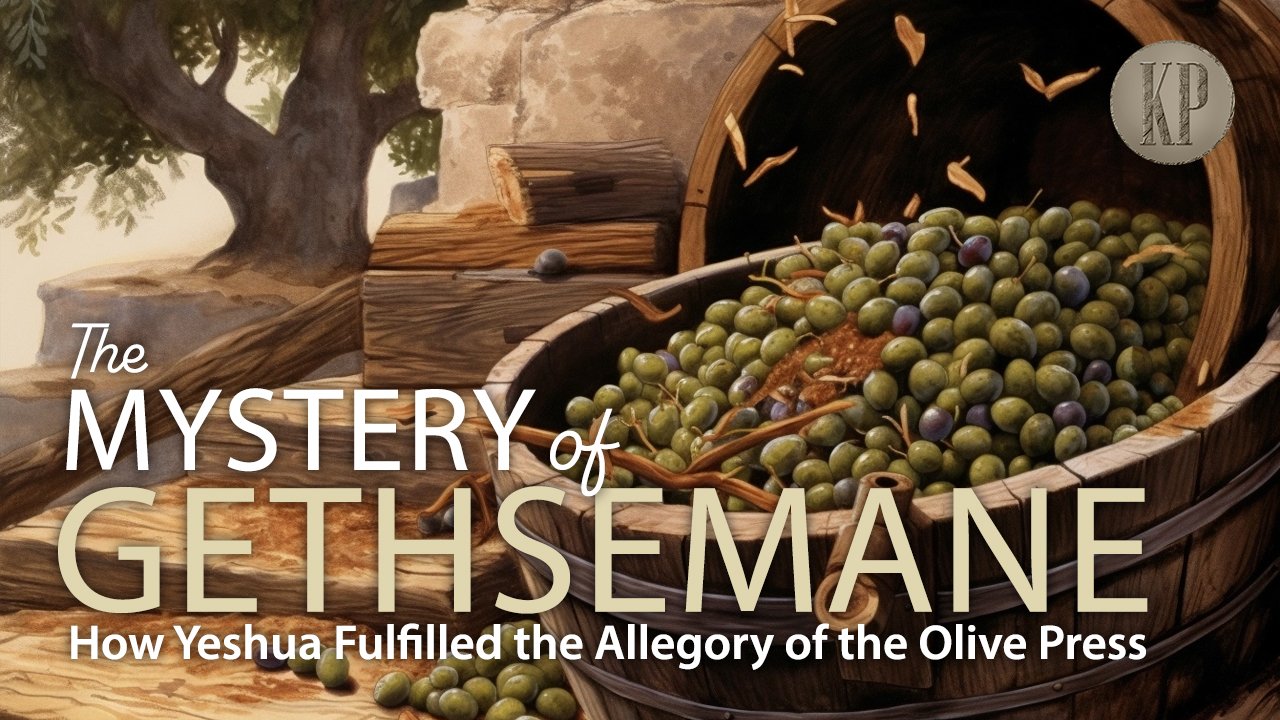On the night before his great sacrifice, Yeshua and his disciples sang a hymn and left the upper room where they had celebrated the Passover. They walked through the streets of Jerusalem under the waning light of the moon.
The disciples followed Yeshua across the Kidron Valley (John 18:1)—or the Valley of Jehoshaphat—up to a small hillside covered with olive trees. This place was called Gethsemane, a name derived from two Hebrew/Aramaic words, Gat Shemanei, which means “oil press.”
It was a garden or grove on the western slope of the Mount of Olives, a ridge east of Jerusalem. The Mount of Olives has a rich scriptural history, as it was the scene of King David’s flight from his rebellious son Absalom (2 Samuel 15:13-30), King Solomon’s idolatry (1 Kings 11:7-8), and several prophecies about the end times (Zechariah 14:1-9; Acts 1:9-12).
Yeshua left eight disciples at the entrance of the garden and took Peter, James, and John with him deeper into the grove, these three being his inner circle. Yeshua often came here to pray (Luke 21:37), but this night was different. He felt a heavy burden of sorrow and anguish as he faced the ordeal ahead of him, so he told the three disciples to watch and pray. Then he went a little farther in, alone. When he found a suitably isolated spot, he fell on his face and poured out his heart to the Most High.
42“Father, if it is your will, take this cup away from me. Nevertheless not my will, but yours, be done.”
—Luke 22:42
What was this cup Yeshua dreaded so much?
It wasn’t just the physical pain and death he would endure on the tree or the shame and rejection he would face from his enemies and friends. The cup included the weight of the sins of all his servants, which he would bear as our substitute. It was also filled with the wrath of Yah Elohim, which he would drink to the dregs as our sin-bearer.
Scripture often uses the image of a cup to represent Yah’s judgment on sin (Job 21:20; Isa. 51:17, 22; Jer. 25:15; Eze. 23:28-34; Hab. 2:16; John 18:10, 11; Rev. 14:9, 10).
Yah, down to his very essence and nature is love. But he is also the Elohim of purity and justice. He hates sin and evil and must deal with those negative forces according to his righteous law. To save us from their eternal consequence, Yeshua had to drink the cup of Yah’s wrath in the place of those who would receive him. He had to suffer the full separation from the Father that sin causes, and he had to endure the darkness and despair of the second death for us.
This was a great weight for Yeshua to bear. He loved his Father with his all and had always enjoyed perfect fellowship with him before his sojourn on this earth (John 17:5). Now he had to face the horror of being forsaken by the Most High. Thus, he pleaded with the Father to spare him from this dreadful cup if there was any other way.
As Yeshua prayed, his agony was so intense that he began to sweat blood. Luke, who was a physician, recorded this detail in his eponymous book (Luke 22:44).
Today, something akin to this is a rare medical condition called hematohidrosis, which can result in blood pushing through the walls of blood vessels and entering the skin. It can stem from multiple underlying causes, such as high levels of stress or excessive physical activity.
Additionally, the location of the events in the “Oil Press” garden, also known as “Gat Shemanei,” has a deep Hebraic and Scriptural significance as it relates to the process of making olive oil. The process of crushing olives into pulp to make oil involved the use of an olive crusher, which was a stone basin.
A millstone was rolled by a horizontal beam that was pushed by a donkey. The ripe olives were placed in a large, round basin and crushed into a pulp. To improve the efficiency of oil production, olive crushers were often placed in caves where the temperature was moderate.
Olives that had already been crushed in an olive crusher were placed under heavy stone slabs with increasing weights. Over time, each weight gradually squeezed the olive oil out of the pulp, causing the oil to flow into a pit. The oil was then collected in clay jars.
There were four stages of pressure, each yielding a different quality of oil.
- The first and purest oil was used for anointing in the Temple.
- The second was for cooking,
- The third was for lighting, and
- The fourth was for cleaning.
In ancient times, olives were also crushed underfoot by someone wearing wooden sandals. Armed with this historical background, we can better comprehend and appreciate the suffering of Yeshua as he accepted his Father’s will. By going through the oil press experience, he was, in a sense, trodden underfoot.
This is not unlike the winepress trodding analogy in Lamentations: “... Yah has trodden as in a winepress the virgin daughter of Judah” (Lam. 1:15). Or the analogy of the nations being trodden in Yah’s anger and wrath:
3I have trodden the winepress alone, and from the peoples no one was with me; I trod them in my anger and trampled them in my wrath; their lifeblood spattered on my garments, and stained all my apparel.
—Isaiah 63:3
Revelation 14:19-20 bears similar language, but it all points to those among Israel and the nations who will go through the millennial experience, being from the final harvest period that requires trampling—the plan of redemption accounts for them as well, as pictured in Gethsemane.
While Yeshua endured this agony, Peter, James, and John were sleeping nearby. They didn’t understand what he was going through and couldn’t stay awake to support him. Yeshua came to them three times and found them asleep. He gently rebuked them and urged them to pray lest they fall into temptation.
Yeshua’s agony reached its climax on the tree when he cried out in a loud voice,
46“My El, my El, why have you forsaken Me?”
—Matthew 27:46
He was quoting the first verse of Psalm 22, a prophetic psalm that described his suffering in detail (Psalm 22:14-18). There was also comfort and hope in this psalm, as it assured that Yah Elohim does not abandon his faithful ones (Psalm 22:3-5). The closing verses (Psalm 22:24-31) also demonstrate that Yeshua’s sacrifice would accomplish the ultimate salvation plan for those of true Israel and the nations joined to them.
Let us never forget what Yeshua did for us at Gethsemane and Golgotha (Gulgoleth). And let us always respond with gratitude, worship, and obedience to him who loved us and gave himself for us.





